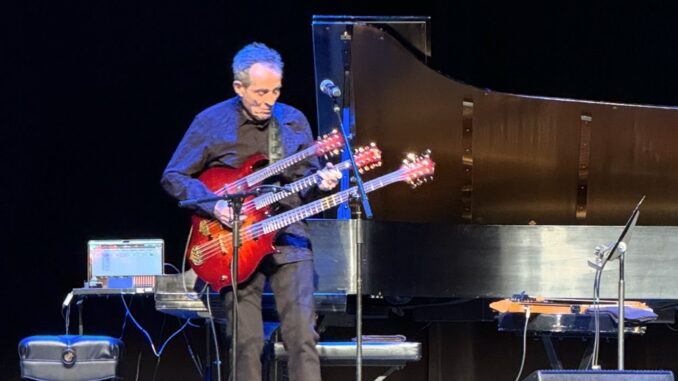
The Big Ears Festival, known for its eclectic and boundary-pushing lineup, truly became a rock lover’s dream when Led Zeppelin’s legendary bassist and keyboardist, John Paul Jones, graced the stage. It was a night filled with magic and nostalgia, as Jones delivered a spellbinding performance that bridged the gap between his historic past with Led Zeppelin and the exciting possibilities of his current musical evolution.
Opening the set in a dramatic fashion, Jones rose from beneath the stage, creating an air of mystery and anticipation. He began with a haunting and ethereal rendition of “Your Time Is Gonna Come” on the pipe organ. The mournful tones filled the venue, drawing the crowd into a shared moment of reverence. It was a performance that immediately reminded everyone of Jones’ incredible versatility. While most people think of him primarily as a bassist, this opening piece demonstrated his mastery of the keyboard and set the tone for a performance that would transcend expectations.
From there, Jones seamlessly moved between instruments, showcasing his unparalleled skill and the depth of his musical talents. A powerful take on “No Quarter” followed, with Jones weaving intricate melodies on the organ while his bandmates contributed to the intense atmosphere. The composition, one of Zeppelin’s iconic tracks, came alive in a new way, with a complexity and subtlety that highlighted Jones’ evolution as a musician beyond his years with the legendary rock band.
The set continued with a soaring, emotional version of “Since I’ve Been Loving You,” a song that demands both technical mastery and deep emotional expression. Jones poured his heart into the performance, his keyboard work underlining the raw intensity of the track. His playing was a reminder of the innovation and power he brought to Led Zeppelin’s music, but also showcased how much his artistry had evolved over the years.
Joining Jones on stage were two notable collaborators: Thurston Moore of Sonic Youth and cellist Anssi Karttunen. This pairing was a deliberate departure from the traditional rock formula, adding a layer of sonic experimentation that reflected Jones’ constant desire to push musical boundaries. Moore’s avant-garde guitar style, combined with Karttunen’s haunting cello arrangements, created a soundscape that was both familiar and entirely fresh. The trio’s chemistry was evident, each musician feeding off the others’ energy to create a performance that was as much about exploration as it was about nostalgia.
Jones’ collaboration with Moore and Karttunen served as a reminder that rock music, at its best, is a constantly evolving force, shaped by its past while always seeking new frontiers. Jones, who had once been at the helm of one of the most influential rock bands in history, demonstrated that his artistic journey is far from over. He continues to embrace new genres and musical ideas, blending rock with classical, experimental, and avant-garde sounds, crafting an experience that was both a celebration of his history and a testament to his current creativity.
For fans of Led Zeppelin, the performance was a delightful reminder of the band’s timeless influence. Yet, it also opened up the possibility of new musical directions, suggesting that Jones’ rock legacy is still evolving. The night marked not only a nod to the past but also a clear affirmation that John Paul Jones is not merely resting on his laurels but actively pushing the boundaries of music. As the performance came to a close, it was evident that Jones’ contribution to rock is as profound and relevant today as it ever was.
The Big Ears Festival, with its reputation for curating forward-thinking and innovative acts, was the perfect setting for this remarkable performance. John Paul Jones, alongside Moore and Karttunen, reminded the audience that true artistry is not confined to any single era but is an ongoing journey—one that continues to inspire and captivate.
Leave a Reply